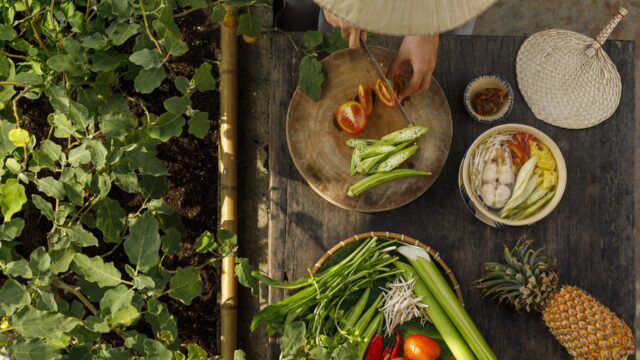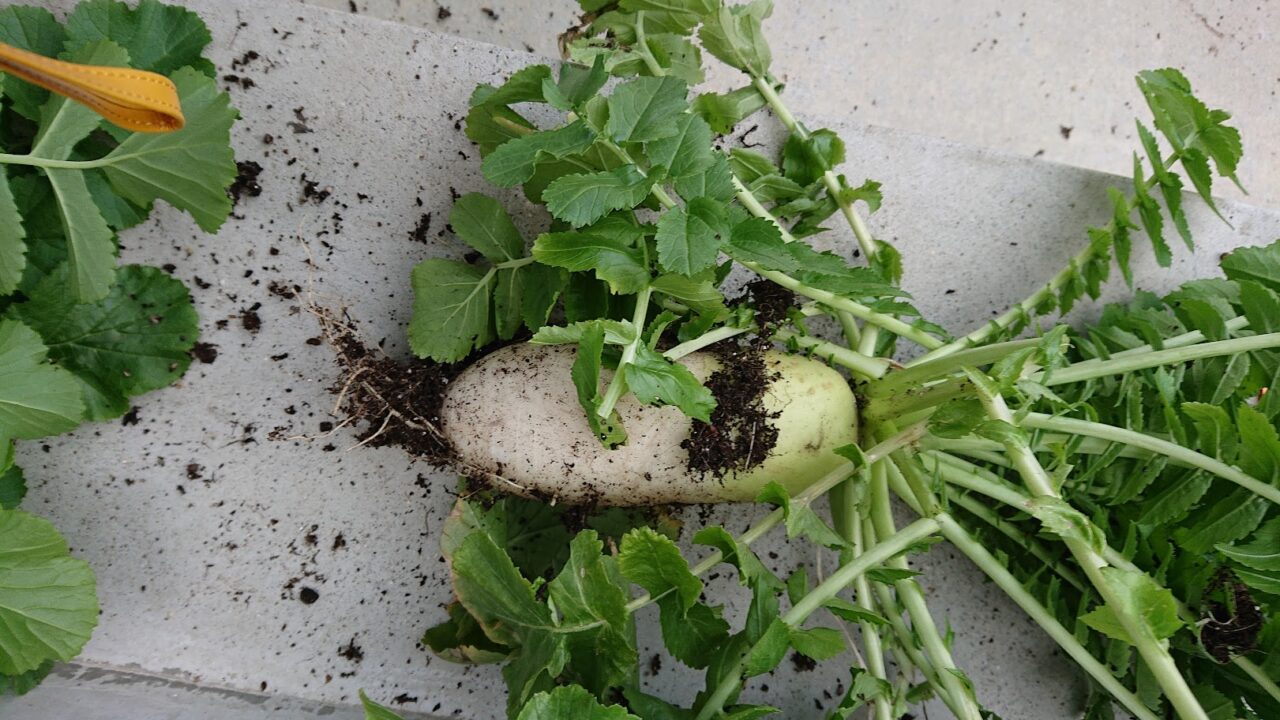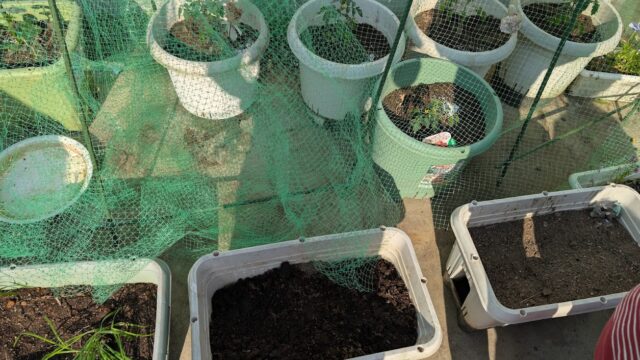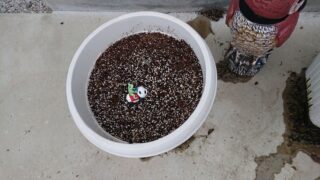去年の秋の終わりに植えて
冬に育った野菜の収穫がすべて終わりました。
All the vegetables planted at the end of last fall and grown over the winter have been harvested.
失敗も成功もありました。
There were both failures and successes.
一番の成功は野菜が上手く生ったこと。
The biggest success was that the vegetables grew well.
一番の失敗は写真をほとんどとっていないことです。
The biggest failure was that I took very few pictures.
目次
意外とうまくできた野菜たち Vegetables that turned out surprisingly well.
植えたのは大根、芽キャベツ、ブロッコリー、レタス、薬味ネギです。
We planted radishes, Brussels sprouts, broccoli, lettuce, and leeks.
そのうち上手くできたのは大根、芽キャベツ、ブロッコリーでした。
Of these, the radishes, Brussels sprouts, and broccoli did well.
まずは大根。 First, radishes.
かなりたくさんの大根がなりました。
There were quite a lot of radishes.
大きいものから小さいものまでありました。
There were large ones and small ones.
冬真っ盛りに取ったものがこれです。
This is what we picked at the height of winter.
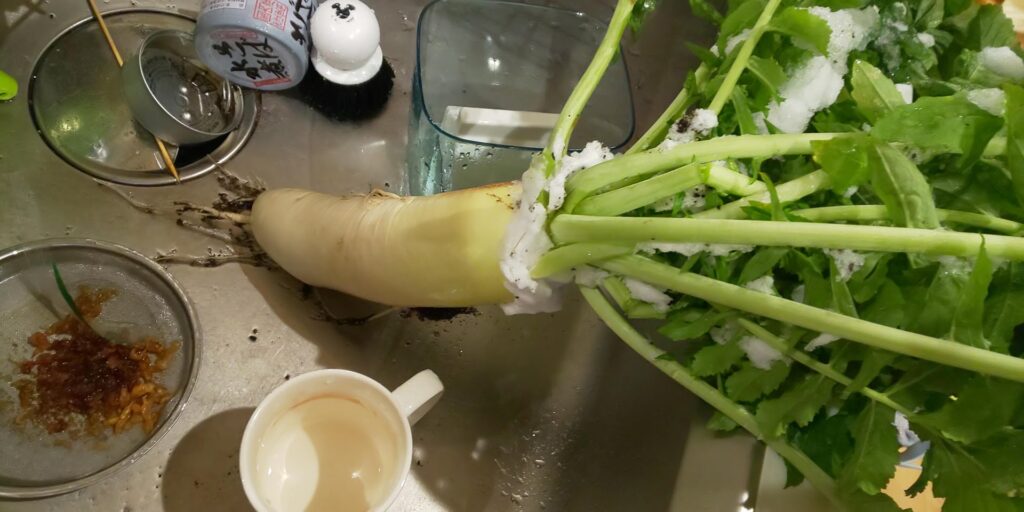
かなり大きく食べ応えがあります。
They are quite large and filling.
最後に取ったものはこちらです。
Here is the last one we picked.
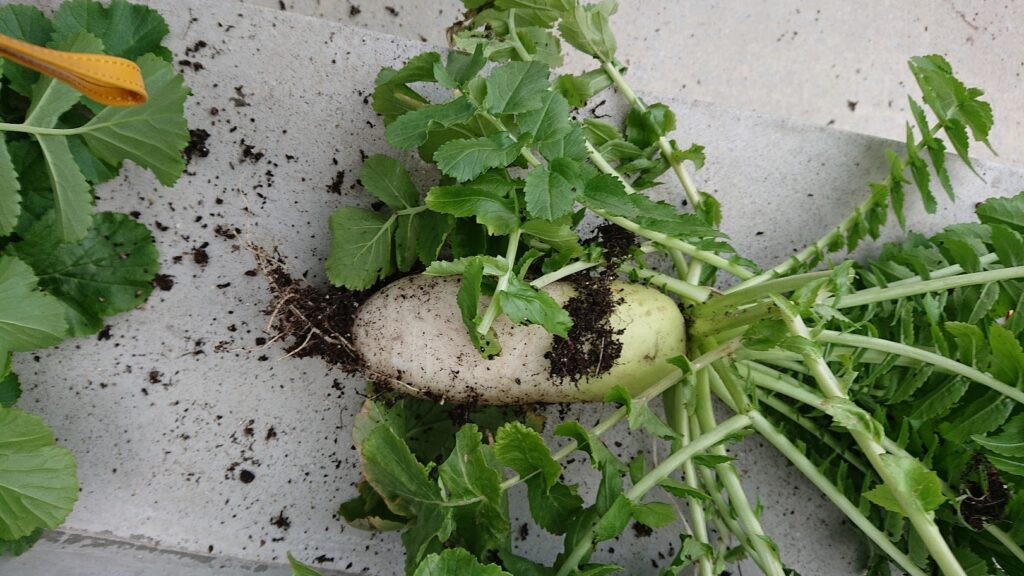
長さは短いですが、太さは十分です。
It is short in length, but thick enough.
家庭菜園での大根でよかったことが2つあります。
There are two good things about growing radishes in our vegetable garden.
まず1つめは、大根がみずみずしい。
The first is that the radishes are fresh.
収穫すぐなので大根が新鮮です。
The radishes are fresh because they have just been harvested.
生で食べたいぐらいです。
I would like to eat them raw.
漬物にするのもったいない気がします。
It would be a waste to make pickles.
2つめ、大根の葉が食べられる。
Second, I can eat the leaves of the radish.
スーパーなどで買おうとすると
大根の葉は手に入りません。
If you try to buy radish leaves at supermarkets, you can’t get them.
大根の葉は、結構私好きで
菜飯だったり、ふりかけだったり、おひたしにして食べます。
I like to eat daikon leaves with greens, furikake, or as boiled vegetables.
おいしいですよ。
They are delicious.
芽キャベツ Brussels sprouts
こちらもうまくできました。
This one also turned out well.
際限なく生まれてくるので
食卓への出現頻度も高くなりました。
Since they are born without limit, they appear more frequently on the table.
もっぱら煮込みにして使いましたが、
これがあるだけで洋風感がアップして
よさげです。
I used them exclusively in stews. It gives it a nice Western feel.
ほろほろにするまで煮て食べるのが好きです。
I like to cook them until they are soft and fluffy.
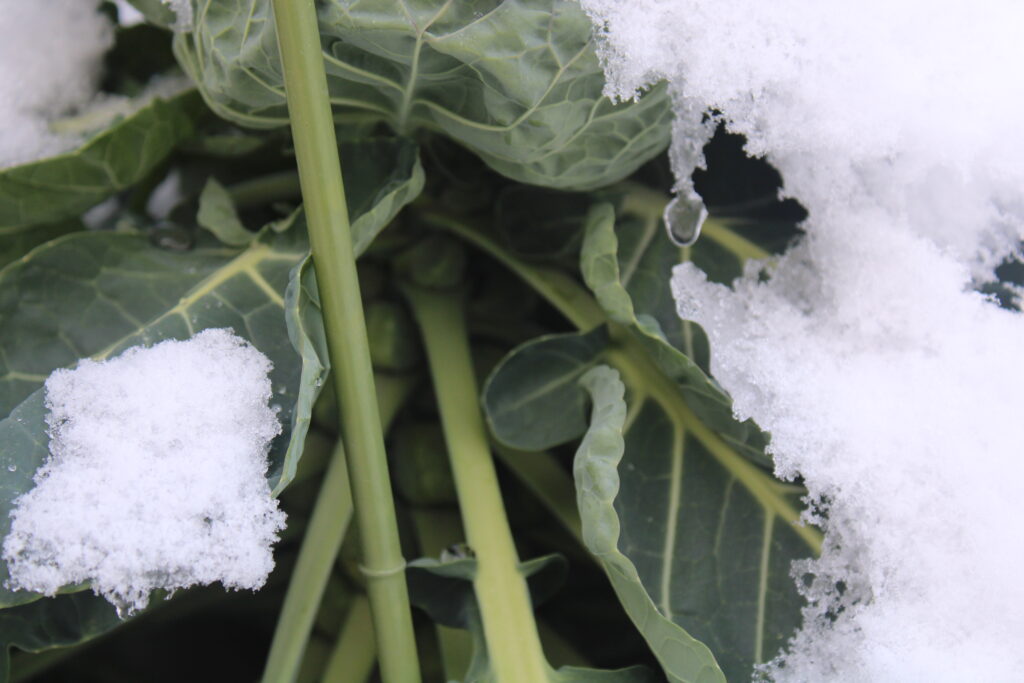
ブロッコリー Broccoli
こちらもまぁまぁでした。
This was so-so.
大きな房がひとつでしました。
I had one big bunch.
こちらも取ったら新しいものが生えてくるとのことだったのですが、
その後育ちませんでした。
We were told that broccoli would grow new ones after being removed, but they did not grow after that.
収穫数1ですが、かなり大きな房だったので良しとします。
I harvested only one, but it was a pretty big bunch, so it was good.
写真ありません。ごめんなさい。
I don’t have a photo. Sorry.
上手くいかなかったこと Things that did not go well
レタスと薬味ネギ Lettuce and leeks
こちら2つの野菜の上手くいかなかった理由は
判明しています。
We know why these two vegetables did not do well.
原因は雪です。
The cause is snow.
雪が降るまでは葉っぱも青々としていて
おいしそうでした。
The leaves were green and looked delicious until the snow fell.
いつ収穫しようかなと思っていた矢先に
雪が降り、やられてしまいました。
Just as I was thinking about when to harvest them, the snow fell and they got hit.
家庭菜園のプランターは基本外放置で雪囲い等もしていませんでした。
The planters in the vegetable garden were basically left outside and were not covered with snow.
大根、芽キャベツ、ブロッコリーは何ともなかったのですが、
レタスと薬味ねぎは完全につぶれてしまい、
痛んでしまったようです。
The radishes, Brussels sprouts, and broccoli were fine, but the lettuce and leeks seemed to have been completely crushed and damaged.
雪が降る前に思い切って収穫してしまえばよかったと思ってます。
I wish I had harvested them before the snow fell.
反省です。
I regret it.
鳥の襲撃 Bird Attacks
雪解けのころを目掛けて野菜の葉っぱを狙って
鳥が来ました。
Birds came to my vegetable garden around the time the snow melted, targeting the leaves of the vegetables.
防護シートで覆ってみましたが、
時すでに遅しで
芽キャベツとブロッコリーが丸裸にされてしまいました。
I covered them with a protective sheet, but the Brussels sprouts and broccoli were stripped naked.
今までそんなことなかったので驚きです。
I was surprised because it had never happened before.
冬だからエサがなくて狙ってきたのでしょう。
It was winter and there was no food for them, so they must have come after them.
来年は冬の鳥対策をしなければと思う、今日この頃です。
I thought that next year I would have to take measures against winter birds.

Note: How to say fresh
There are multiple ways to say fresh in Japanese.
“Mizu mizu shii.”
The word “Mizu mizu shii.” is often used to describe the freshness of fruits and vegetables.
”Mizu” means water.
It means that the leaves are crispy and full of water and juice.
“Iki iki shiteiru”
“Iki iki shiteiru” is often used to describe the freshness of seafood.
The word “fresh” is often used to describe the freshness of seafood, and is close to the meaning of “alive” when referring to freshly caught fish.
Both translate to “fresh” in English.
Interesting.
”Kito kito”
But there are also words that we, who use them everyday, don’t understand.
Dialects are a good example.
In the Toyama Prefecture dialect, there is a word “kito kito.
It is used for freshness in general.
Mizu mizu shii.” and “Iki iki shiteiru” can be guessed by those who use or study Japanese on a daily basis.
However, “Kiitokito” has no meaning at all.
This is the difficult part of the Japanese language.
There are words that even Japanese people do not know the meaning of.
Please do not be discouraged and keep trying.


